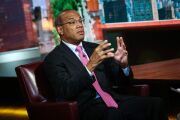With demand for alternative investments surging, a startup launched by a leadership and financial literacy professor aims to use the products to help close the racial wealth gap.
More than 200 Black investors have joined Amass, a syndicate and investment club that former NFL coach, current impact investment firm partner and University of Texas at Austin professor Daron Roberts opened last month. Roberts aims to work with financial advisors and other wealth management professionals to boost access to products such as its first, a real estate special purpose vehicle. He and co-founder Abby Coleman developed the idea for Amass after the murder of George Floyd last year, when the overarching need to build generational wealth among Black Americans “kept coming back to me,” Roberts said in an interview.
Alternative investments in assets such as private debt for real estate and business ventures have emerged as a potential tool increasing the flow of capital to underserved areas and enabling historically excluded groups such as Black Americans to tap into wealth. For instance, four NBA All-Stars and more than 150 Black and Latino investors are
“The model right now is that you need to know someone who can get into a deal,” he said, noting further hurdles relating to high fees and minimum investments. “We're going to bring you deal flow through our relationships and then we are going to drastically lower the barrier to entry.”
Amass is reducing the fees to “the base amount” needed for CPAs, lawyers and other professionals servicing the products and 5% of the profit rather than the traditional 20%, according to Roberts, the author of a 2017

Their goal is to provide an “onramp for Black investors,” said Coleman, who also worked with Roberts at Notley Ventures, an Austin-based investment manager and philanthropy fund where he’s a partner.
“It feels like an almost impossible problem to approach until you begin thinking of the human side,” Coleman said of the
Indeed, new and growing private debt instruments form a burgeoning area of racial equity investing,
Amass reminded author Sharlene Brown, a senior fellow with the institute, of the informal bank-like groups used around the world for hundreds of years known as rotating credit and savings associations. Brown, who is Jamaican American and has worked for decades internationally in microfinance, often tells the story of her mother buying her home through a community savings system called a Partner, she said in an interview.
“It resonated with both my cultural experience as well as my professional experience overseas,” Brown said. “I love the power of that, because the community comes together.”
Roberts plans to launch at least one new investment for members of Amass each month, though he says they’re already on track to surpass that rate. Last year, he realized that he had learned of early stage investments and other alternative products only because he had lived down the hall from a founder at Harvard Law or met them through a venture fund or another connection at the investment firm, he said.
“There are these closed spaces,” Roberts said. “We're really trying to invert that model.”







